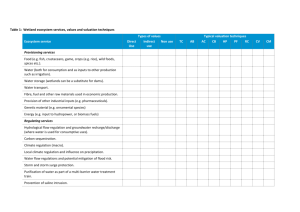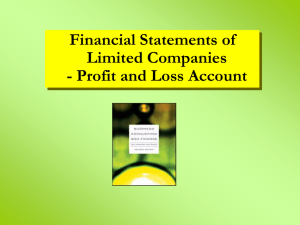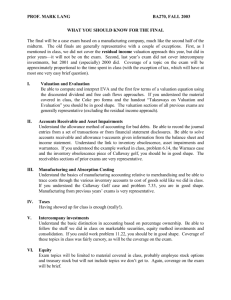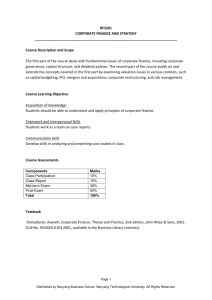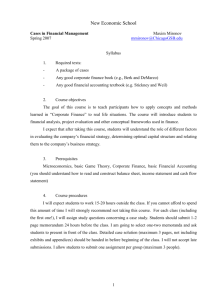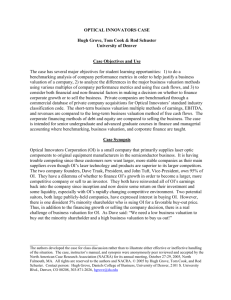Syllabus - Columbia University
advertisement
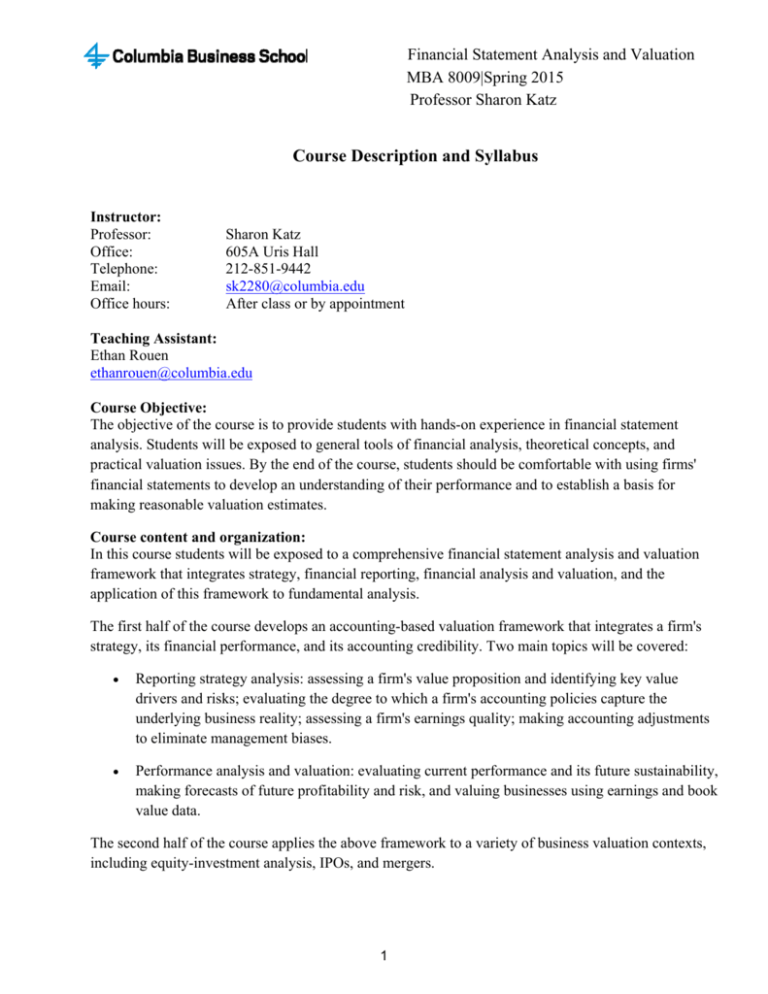
Financial Statement Analysis and Valuation MBA 8009|Spring 2015 Professor Sharon Katz Course Description and Syllabus Instructor: Professor: Office: Telephone: Email: Office hours: Sharon Katz 605A Uris Hall 212-851-9442 sk2280@columbia.edu After class or by appointment Teaching Assistant: Ethan Rouen ethanrouen@columbia.edu Course Objective: The objective of the course is to provide students with hands-on experience in financial statement analysis. Students will be exposed to general tools of financial analysis, theoretical concepts, and practical valuation issues. By the end of the course, students should be comfortable with using firms' financial statements to develop an understanding of their performance and to establish a basis for making reasonable valuation estimates. Course content and organization: In this course students will be exposed to a comprehensive financial statement analysis and valuation framework that integrates strategy, financial reporting, financial analysis and valuation, and the application of this framework to fundamental analysis. The first half of the course develops an accounting-based valuation framework that integrates a firm's strategy, its financial performance, and its accounting credibility. Two main topics will be covered: Reporting strategy analysis: assessing a firm's value proposition and identifying key value drivers and risks; evaluating the degree to which a firm's accounting policies capture the underlying business reality; assessing a firm's earnings quality; making accounting adjustments to eliminate management biases. Performance analysis and valuation: evaluating current performance and its future sustainability, making forecasts of future profitability and risk, and valuing businesses using earnings and book value data. The second half of the course applies the above framework to a variety of business valuation contexts, including equity-investment analysis, IPOs, and mergers. 1 Connection to the core The learning in this course will utilize, build on and extend concepts covered in the following core courses. Students will be expected to have mastered these concepts and be able to apply them in the course. Core Course Connection with Core Financial Accounting The different financial statements and their line items The “accounting equation” (Assets = Liabilities + Equity) Accounting concepts (e.g., revenue recognition, matching) Cash vs. accrual accounting Corporate Finance Firm valuation model Cost of capital (e.g. CAPM, WACC) Time value of money Strategy Formulation Sources of economic value Who should take this course? This course is aimed at all students who expect at some point in their careers to use financial statements to evaluate the performance, prospects, and value of a business. The primary emphasis will be on the analysis of public companies, but many tools and techniques utilized are relevant to private enterprise financial analysis as well. Please note that this is not a course on “forensic accounting.” We will focus on accounting issues so that we can “cleanse” the financial statements before we carry out any analysis. Please look through the session by session outline to get a better feel for what this course entails. Emphasis on Cases: We will use the case method almost exclusively in this course. There will be at least nineteen full-class length cases during this course. Method of Evaluation: Grading will be based on a combination of the following. Class Participation: 40% Individual or Group Project: 50% (Assignment Type B or A) Individual or Group Case Submissions: 10% (Assignment Type B or A) [In accordance with Columbia Business School’s policy all grade appeals should be made in writing]. Class Participation: Class Participation is essential for a course such as Financial Statement Analysis and Valuation to ensure that one learns from the experiences of others and meaningfully contributes to the overall discussion. Grading for class participation will be based on factors such as quality of participation, interest, level of participation, and attendance. Everyone should come to class having read the materials assigned and prepared the cases. I will cold call in class, both at the beginning of the case discussion and during the class. 2 Individual or Group Project: To deepen students' ability to apply the course skills in a practical context, they will work on a group or individual project. Individual students or team of two students will apply complete financial statement analysis of a firm using the course framework. Additional information will be provided about the project as the course progresses. (Assignment Type B or A). Individual or Group Case Submissions: Individual students or team of two students will need to hand in three out of six case assignments during the first half of the course. (Assignment Type B or A). Curriculum Materials: This course will rely heavily on the textbook, "Business Analysis and Valuation using Financial Statements”, By Palepu & Healy (5th edition). Almost all the readings will be from the book. There are two versions of the book. It is important to get the edition without the cases as the relevant cases are in the course packet. It is a hard-cover book: ISBN-13: 978-1111972301 (ISBN-10 1111972303). The book should look like: In addition, I will occasionally provide handouts, research papers relevant to the course, and clippings from the business press. There will also be a course packet with handouts, case materials and PowerPoint slides. I will use CANVAS for posting assignments and announcements. About me: I have been at the Columbia Business School since 2010, after spending four years teaching at Harvard Business School. I have a Ph.D. in Business Administration from Columbia Business School, an MBA from UCLA, and a B.A. in economics and LL.B. in law from Tel-Aviv University. I have served in the Israeli Air Force, and have worked as a corporate lawyer in Israel and as an investment banker in NYC. 3 Course Outline (Indicative – Refer to CANVAS for details) Session (Date) Module Topic Case / Lecture 1 (1/28) 2 (2/02) 3 (2/04) Introduction Accounting Analysis Accounting Analysis Course Overview Revenue Recognition Expensing versus Capitalizing HurryDate Bausch & Lomb, Inc. (A) PolyMedica Corporation Yes* 4 (2/09) 5 (2/11) Accounting Analysis Accounting Analysis Boston Chicken, Inc. Land Securities Group Yes* 6 (2/16) Financial Analysis Consolidation Fair Value versus Historical Cost Financial Ratios 7 (2/18) 8 (2/23) Financial Analysis Financial Analysis Debt Covenants Regulatory Capital 9 (2/25) Prospective Analysis - Forecasting Forecasting (commodities) 10 (3/02) Prospective Analysis - Forecasting Prospective Analysis - Forecasting Prospective Analysis - Forecasting Prospective Analysis – Valuation Prospective Analysis – Valuation Forecasting (stores) Target Corporation: Ackman versus the Board Home Depot, Inc. Citigroup 2007: Financial Reporting and Regulatory Capital Kevin McCarthy and Westlake Chemical Corp (A) Krispy Kreme Doughnuts Forecasting (mean reversion) Lecture - Dupont Forecasting (condensed ratios) Corrections Corp. of America Lecture - RI/DCF Yes* 1. 2. Yes* Prospective Analysis – Valuation Applications Applications Review Class and Project 11 (3/04) 12 (3/06) 13 (3/23) 14 (3/25) 15 (3/30) 16 (4/01) 17 (4/06) Residual Income (RI) Model Applications of RI, PB, PE Exercises Valuation Ratios in the Restaurants Industry Lecture - Review Group Case/Project Submissions* Readings Chapter 1 Chapter 4 Chapter 5 Yes* Yes* Chapter 6 Chapter 7 Chapter 8 Plain Vanilla Valuation IPO Ryanair Holdings plc United Parcel Service's IPO 18 (4/08) Applications IPO United Parcel Service's IPO 19 (4/13) Applications Equity Analysis Pre-Paid Legal Services, Chapter 9 Inc. 20 (4/15) Applications Emergence from Bankruptcy Eddie Bauer (A) 21 (4/20) Applications M&A Schneider and Square D Chapter 11 22 (4/22) Applications Alternative Model Transparent Value** 23 (4/27) Applications LBO Dollar General Going Project Private Submission* 24 (4/29) Summary Wrap-up Summary/Debrief * Group case submissions: Individual students or team of two students will need to hand-in three out of six case assignments and a project. **The class on 4/22 is cancelled. Students can either attend a make-up class session that will be scheduled on Friday in the month of April or watch the class video recording, which will be posted on Canvas. 4


